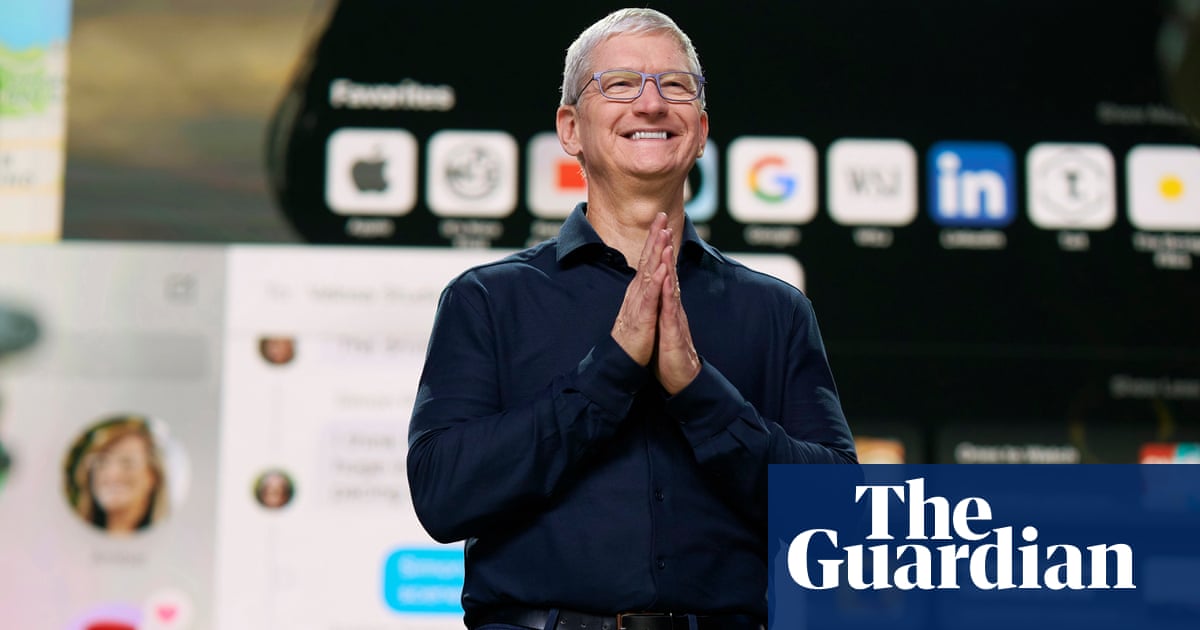
It’s good to have friends. They come to your birthday party, offer a shoulder to cry on when things are hard and spend precious corporate resources developing apps for your nascent virtual reality platform despite little direct return. It can be tempting to believe that a pile of cash worth $30bn, and a single product line that brings in more than $200bn a year, is an acceptable substitute. But Apple is learning that money can’t buy you everything.
Last week, pre-orders opened for the company’s Vision Pro headset, the $3,500 “spatial computing” platform CEO Tim Cook has positioned as the successor to the Mac and iPhone and the launch of the third major era in Apple’s history. But in the press, the launch has been overshadowed by the quiet hostility towards the device from those whose support will ultimately be needed to ensure its success.
From Bloomberg (£):
Rather than designing a Vision Pro app – or even just supporting its existing iPad app on the platform – Netflix is essentially taking a pass. The company, which competes with Apple in streaming, said in a statement that users interested in watching its content on the device can do so from the web.
Developing an app for a new platform is risky and expensive. In the first weekend the Vision Pro was on sale, it sold an estimated 160,000 to 180,000 units, according to analyst Ming-Chi Kuo. Even if everyone installed the new Netflix app, that would be a drop in the bucket of the company’s 250 million paid subscribers.
And Netflix isn’t in the business of app installs; its business is paid subscriptions. The cost of developing an app for a new platform is only worth it if it brings new customers or keeps existing subscribers from cancelling.
So it makes sense why the company might be unwilling to spend the resources on a Vision Pro app, even if Apple is keenly marketing the device as the most immersive way possible to watch TV. Netflix has similarly abandoned updating its app for the Meta Quest, Mark Zuckerberg’s money-shedding attempt to make “metaverse” a thing.
In both cases, that means users are stuck loading up the web version of Netflix if they want to watch TV in virtual reality – and so losing the ability to watch shows offline (a cinematic experience on a flight, for instance), one of the key selling points of the headsets.
But not only did Netflix not invest in app development, it also actively intervened to keep its service off the headset. The Vision Pro can run iPhone and iPad apps in a “compatibility mode”, unless developers specifically opt-out. That’s precisely what Netflix did, and it’s not alone. Bloomberg, again (£):
YouTube … isn’t planning to launch a new app for the Apple Vision Pro, nor will it allow its longstanding iPad application to work on the device – at least, for now […] Spotify also isn’t currently planning a new app for visionOS – the Vision Pro’s operating system – and doesn’t expect to enable its iPad app to run on the device when it launches, according to a person familiar with matter.
Why are all these companies taking active measures to prevent Vision Pro users accessing their services? It could simply be a passion for quality: as anyone who has used an iPhone app on an iPad, or an iPad app on a Mac, has discovered, just because something made for one platform can theoretically run on another, doesn’t necessarily mean it feels good when it does.
But I think there’s a hint in the other major Apple story of the last week: the company’s grudging acquiescence of a court requirement to let developers bypass Apple’s own payment systems.
Developers of iPhone apps now have a choice. They can either bill customers through Apple’s system, and pay the company a 30% cut, or pay a much cheaper third party around 3% … and then pay Apple a 27% cut. From Apple:
All App Store developers – including those who place buttons or links with calls to action in their apps – benefit from Apple’s proprietary technology and tools protected by intellectual property, and access to its user base. […] Apple’s commission will be 27% on proceeds you earn from sales.
The company is clear: it is entitled to a cut of all the economic activity produced through the App Store. It doesn’t capture “all transactions that Apple has facilitated”, but charging on digital purchases is “a reasonable means to account for the substantial value Apple provides developers”, it says.
The iPhone is an enormously valuable platform, which is how Apple can impose such extractive terms on anyone who wants to develop for it. But Vision Pro … isn’t. It might be, one day, but if it does, there will be plenty of time to develop for it down the line. And in the meantime, if you’re a developer being asked to spend time and money making Apple’s latest business venture succeed, you might be wondering: is it actually in your interest to help that happen?
Mark Zuckerberg wants to build a god. From our story by Dan Milmo:
The Meta chief executive has said the company will attempt to build an artificial general intelligence (AGI) system and make it open source, meaning it will be accessible to developers outside the company. The system should be made “as widely available as we responsibly can”, he added.
AGI is not a strictly defined term, but it commonly refers to a theoretical AI system that can carry out an array of tasks at a level of intelligence that matches or exceeds humans. The potential emergence of AGI has alarmed experts and politicians around the world who fear such a system, or a combination of multiple AGI systems, could evade human control and threaten humanity.
Facebook’s pivot from the metaverse is complete.
Don’t expect Zuck to ever fully admit that the billions spent on pursuing a dream where we all socialised in virtual reality spaces controlled by his company was wasted capital. But the writing was on the wall for this pivot ever since its October 2022 quarterly results, which showed a $4bn loss on the metaverse division in just three months, were followed almost immediately by the burst of explosion in AI generated by ChatGPT’s launch the following month. (In May the following year, for what it’s worth, he explicitly said it was “not accurate” to claim such a pivot was happening.)
As with the metaverse push before it, this sort of goal is, for better or worse, one you can only have when a founder/CEO still has absolute control of the company he built. There’s no business case, really, for building god and then releasing it for free for anyone to use. Other companies would probably focus on shorter-term benefits, such as using LLMs for content moderation. But credit to Zuckerberg for recognising that the world is more interesting when billionaires spend unbelievable quantities of other people’s money on whims.
If you want to read the complete version of the newsletter please subscribe to receive TechScape in your inbox every Tuesday.
This article was amended on 23 January 2024. An earlier version incorrectly said that Netflix had not published an app for the Meta Quest. The company published an app in 2019, but has not updated it.












